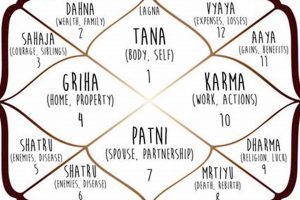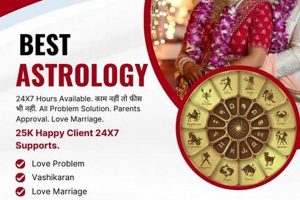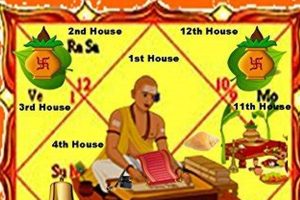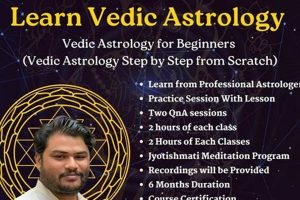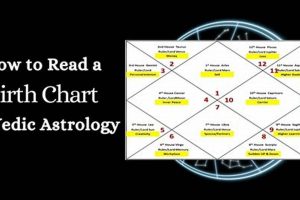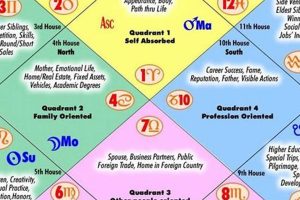Locating local practitioners of Jyotish, the traditional Hindu system of astrology, involves searching for services offered within one’s geographical area. This typically includes consultations on birth charts (natal charts), predictive astrology, relationship compatibility (synastry), electional astrology (choosing auspicious times), and remedial measures (gemstones, mantras, rituals). An example would be seeking guidance on career prospects or relationship dynamics based on planetary positions and individual birth charts.
Jyotish consultations offer individuals personalized insights into their lives based on celestial influences. This ancient system provides a framework for understanding karmic patterns, life purposes, and potential challenges. By understanding these influences, individuals can make informed decisions and navigate life’s complexities with greater awareness. Historically, Jyotish has been integral to Indian culture, guiding individuals and communities in various aspects of life, from personal decisions to societal events.
This exploration delves into the practice of seeking local Jyotish consultations. Key topics covered include the process of finding reputable practitioners, understanding the various services offered, and preparing for a consultation to maximize its benefits. Further sections will address the ethical considerations and potential challenges involved in seeking such guidance.
Tips for Finding Jyotish Consultations Locally
Locating qualified and reputable practitioners of Vedic astrology requires careful consideration and research. The following tips offer guidance for navigating this process effectively.
Tip 1: Seek Referrals and Recommendations: Leverage personal networks and online communities focused on spirituality or Vedic traditions. Reputable practitioners often build their clientele through word-of-mouth referrals.
Tip 2: Verify Credentials and Experience: Inquire about a practitioner’s training, lineage, and years of experience. Look for certifications or affiliations with recognized Jyotish organizations.
Tip 3: Clarify Consultation Methods and Fees: Understand whether consultations are offered in person, online, or via telephone. Inquire about the fee structure and payment methods upfront to avoid misunderstandings.
Tip 4: Prepare Questions in Advance: Prepare specific questions related to areas of life where guidance is sought. This ensures the consultation addresses individual needs and priorities.
Tip 5: Approach with an Open Mind and Realistic Expectations: While Jyotish can offer valuable insights, it’s essential to approach consultations with a balanced perspective and avoid unrealistic expectations.
Tip 6: Be Wary of Guarantees or Sensational Claims: Authentic Jyotish practitioners typically avoid making guarantees or promises of specific outcomes. Exercise caution with practitioners who make such claims.
Tip 7: Trust Intuition and Personal Resonance: Choosing a practitioner is a personal decision. Trust one’s intuition and select someone whose approach resonates with individual preferences and values.
By following these guidelines, individuals can increase their likelihood of finding a qualified and ethical Jyotish practitioner who can provide valuable insights and guidance.
These tips represent a starting point for navigating the search for local Jyotish expertise. Concluding remarks will offer further considerations and perspectives on integrating these insights into one’s life.
1. Qualified Practitioners
The efficacy of a Vedic astrology reading hinges significantly on the practitioner’s qualifications. A qualified practitioner possesses a deep understanding of Jyotish principles, including planetary influences, house significations, and the intricacies of birth chart interpretation. This expertise translates into accurate assessments and personalized guidance. For instance, a practitioner’s ability to discern subtle planetary combinations can reveal nuanced insights into an individual’s personality, karmic patterns, and potential life paths. Conversely, a lack of qualification may lead to misinterpretations and potentially harmful advice. Seeking local expertise necessitates verifying credentials and experience to ensure the reading’s integrity and value.
The importance of qualified practitioners extends beyond technical proficiency. Ethical conduct and client-centered approaches are crucial aspects of professional practice. A qualified practitioner maintains client confidentiality, avoids making unrealistic promises, and focuses on empowering clients through self-awareness and informed decision-making. They act as guides, facilitating understanding and offering perspectives based on astrological principles, rather than dictating outcomes or promoting dependency. This emphasis on ethical practice safeguards clients and contributes to the positive development of Vedic astrology.
In summary, the quest for a meaningful Vedic astrology reading necessitates prioritizing qualified practitioners. Verifying credentials, seeking referrals, and evaluating ethical conduct are vital steps in this process. By emphasizing these factors, individuals seeking local consultations can ensure the integrity, accuracy, and ethical foundation of their astrological experience, contributing to a more informed and empowering engagement with this ancient tradition.
2. Personalized Consultations
The value of a Vedic astrology reading lies in its personalized nature. Unlike generalized horoscopes, a personalized consultation delves into the specifics of an individual’s birth chart, offering unique insights and tailored guidance. Proximity becomes a key factor when seeking such personalized insights, as it often facilitates direct interaction with a practitioner, fostering a deeper understanding and a more nuanced interpretation of astrological influences.
- Birth Chart Analysis
The cornerstone of personalized consultations is a thorough analysis of the individual’s birth chart. This involves examining the placement of planets at the time of birth, the relationships between planets, and the influences of specific astrological houses. This analysis provides a comprehensive understanding of an individual’s strengths, weaknesses, karmic patterns, and potential life path. For instance, the position of the Moon can reveal emotional tendencies, while the placement of Saturn may indicate areas of challenge and growth. Within the context of local consultations, this detailed analysis can be discussed in person, allowing for a deeper exploration of nuances and a clearer understanding of the chart’s implications.
- Specific Life Areas
Personalized consultations allow individuals to focus on specific areas of life where they seek guidance. This could include career prospects, relationship dynamics, health concerns, or spiritual growth. By tailoring the consultation to individual needs, practitioners can provide targeted advice and insights. For example, someone seeking career guidance might focus on the tenth house of their chart and the planets influencing it. Local practitioners can offer culturally relevant advice and connect individuals with resources within their community.
- Remedial Measures
Vedic astrology often suggests remedial measures to mitigate potential challenges or enhance positive influences. These measures can include gemstone recommendations, mantra practices, or specific rituals. Personalized consultations ensure that these remedies are tailored to the individual’s specific needs and astrological circumstances. A local practitioner can provide guidance on obtaining gemstones, performing rituals, or connecting with other resources within the community to support the implementation of these remedies. This local connection can be invaluable in facilitating practical application and fostering a supportive environment.
- Building a Relationship
Personalized consultations, especially those conducted locally, offer the opportunity to build a relationship with a practitioner. This ongoing connection can be beneficial for receiving continued guidance, clarifying questions, and deepening one’s understanding of Vedic astrology over time. This relationship facilitates open communication and allows the practitioner to provide more nuanced support as they become more familiar with the individual’s life and circumstances. Local access facilitates this ongoing connection and fosters a sense of trust and understanding.
The emphasis on personalized consultations underscores the importance of finding a practitioner who can provide tailored insights and guidance. By focusing on the specific needs and circumstances of the individual, a Vedic astrology reading can offer a deeper understanding of oneself and one’s life path. Local consultations often enhance this personalization by fostering direct communication and building a stronger practitioner-client relationship, thereby maximizing the benefits of this ancient practice.
3. Birth Chart Analysis
Birth chart analysis forms the foundation of any Vedic astrology reading. Locating a practitioner “near me” emphasizes the personalized nature of this analysis, suggesting a preference for direct interaction and a potentially deeper exploration of one’s astrological blueprint. Understanding the components of birth chart analysis provides a framework for navigating a consultation and maximizing its benefits.
- Planetary Placements
Planetary placements at the time of birth reveal key personality traits, strengths, and challenges. For example, a prominent Sun placement might indicate a natural inclination towards leadership, while a Saturn placement in the seventh house could suggest difficulties in relationships. A local reading allows for a nuanced discussion of these placements within the context of an individual’s life experiences, cultural background, and specific questions. This personalized interpretation differentiates a local reading from generalized online assessments.
- Astrological Houses
The twelve astrological houses represent different spheres of life, from career and finances to relationships and spirituality. Planetary placements within these houses indicate areas of focus and potential experiences. For instance, Jupiter in the second house might suggest financial prosperity, while Mars in the fourth house could indicate domestic disputes. A practitioner located nearby can offer insights into these influences based on an understanding of local customs and societal norms, providing a more relevant interpretation.
- Planetary Aspects
Planetary aspects refer to the angular relationships between planets in a birth chart. These relationships, whether harmonious or challenging, influence how planetary energies interact and manifest in an individual’s life. A beneficial aspect between Venus and Jupiter might suggest good fortune in relationships and finances, while a challenging aspect between Mars and Saturn could indicate difficulties with discipline and control. Discussing these nuances with a local practitioner facilitates a deeper understanding of these complex interactions and their potential impact.
- Dashas and Transits
Dashas are planetary periods that influence specific areas of life over defined timeframes. Transits refer to the current movement of planets and their impact on the birth chart. Analyzing dashas and transits provides insights into current and future trends. A local practitioner can offer guidance on navigating these periods based on a personalized understanding of the individual’s chart and current circumstances. This predictive element of birth chart analysis helps individuals prepare for potential challenges and capitalize on opportunities.
These components of birth chart analysis highlight the depth and complexity of a Vedic astrology reading. Seeking a reading “near me” emphasizes the value of personalized interpretation and direct interaction with a practitioner. This local connection facilitates a more nuanced understanding of astrological influences, empowering individuals to navigate life’s complexities with greater awareness and insight.
4. Predictive Techniques
Predictive techniques within Vedic astrology, or Jyotish, provide a framework for understanding potential future trends and life events. Locating a practitioner “near me” suggests a desire to apply these techniques to personal circumstances, leveraging localized insights and building a relationship with an astrologer for ongoing guidance. Understanding these techniques is crucial for a meaningful consultation and for interpreting predictions within the context of one’s life.
- Dasha Systems
Dasha systems are planetary periods that govern specific timeframes in an individual’s life. Each dasha is associated with a particular planet and signifies a period influenced by that planet’s energy and characteristics. For example, a Venus dasha might bring focus to relationships and creative pursuits, while a Saturn dasha could present challenges and opportunities for growth and discipline. A local practitioner can offer personalized interpretations of these dashas based on individual birth charts and current life circumstances, providing a roadmap for navigating these periods effectively.
- Transits
Transits refer to the current movement of planets through the zodiac and their influence on the natal chart. Analyzing transits helps understand current astrological influences and their potential impact on various life areas. For instance, a Jupiter transit over the tenth house might indicate career advancement, while a Saturn transit over the Moon could signify emotional challenges. A local astrologer can interpret these transits within the context of individual charts and local circumstances, offering timely guidance and potential strategies for navigating these influences.
- Annual Charts
Annual charts, such as the Varshaphala, provide a yearly overview of astrological influences. They offer insights into potential themes and events that might unfold during a specific year. These charts help individuals anticipate challenges and opportunities and make informed decisions. A local practitioner can analyze these charts in conjunction with the natal chart and current transits, providing a comprehensive yearly forecast. This yearly perspective aids in planning and preparation.
- Muhurta (Electional Astrology)
Muhurta, or electional astrology, involves selecting auspicious times for important events, such as starting a new venture, getting married, or signing a contract. This practice aims to align actions with favorable planetary influences to increase the likelihood of success. Local practitioners can incorporate local customs and traditions into Muhurta calculations, providing culturally relevant guidance. This personalized approach ensures alignment with both astrological principles and cultural norms.
These predictive techniques provide a framework for understanding potential future trends and navigating life’s complexities with greater awareness. Seeking these insights from a local practitioner adds a layer of personalization and cultural relevance, enhancing the application of these techniques to individual circumstances. By combining these predictive tools with a thorough understanding of one’s birth chart, individuals can gain valuable insights and make more informed decisions in various life areas.
5. Remedial Measures
Remedial measures in Jyotish, often explored during consultations, aim to mitigate potential challenges or enhance beneficial planetary influences indicated within a birth chart. These measures, which can include gemstone recommendations, mantra practices, charitable acts, and specific rituals, are not viewed as quick fixes but rather as supportive practices to align oneself with cosmic energies. The proximity implied by “near me” suggests a preference for local practitioners who can offer culturally relevant remedies and connect individuals with resources within their community. For example, a practitioner might recommend specific charities or temples for performing prescribed rituals or suggest locally sourced gemstones based on individual needs.
The efficacy of remedial measures is understood within the context of karma and free will. Jyotish does not propose fatalistic outcomes; rather, it offers a framework for understanding karmic predispositions and potential life paths. Remedial measures are viewed as tools to navigate these predispositions with greater awareness and to potentially mitigate challenges through conscious action. For instance, while a challenging planetary placement might indicate potential financial difficulties, engaging in prescribed remedies, such as chanting specific mantras or performing charitable acts related to wealth, is believed to strengthen one’s financial prospects and mitigate potential losses. Finding a practitioner within one’s local area can often provide access to resources and support networks that facilitate the practical application of these remedies.
Integrating remedial measures into a Jyotish consultation requires careful consideration and a personalized approach. A qualified practitioner assesses an individual’s birth chart, current life circumstances, and personal inclinations before recommending specific remedies. The “near me” aspect facilitates direct interaction with the practitioner, fostering open communication and ensuring the prescribed remedies align with individual needs and cultural context. This personalized approach emphasizes the importance of finding a practitioner who understands the nuances of both astrological principles and local customs. While remedial measures offer potential support, they are most effective when integrated into a holistic approach that includes self-reflection, informed decision-making, and ethical conduct.
6. Local Availability
Local availability plays a significant role in the accessibility and personalization of Vedic astrology readings. Seeking a reading “near me” implies a preference for in-person consultations and the benefits associated with direct interaction with a practitioner. This preference often stems from several key factors that enhance the overall experience and contribute to a more meaningful engagement with Jyotish.
- Building Rapport and Trust
In-person consultations facilitate the development of rapport and trust between the client and practitioner. Nonverbal cues, direct communication, and the shared experience of physical presence contribute to a stronger connection. This established trust enhances open communication and allows for a more comfortable exploration of sensitive or personal topics. For example, discussing family matters or relationship challenges can be facilitated by the empathetic environment fostered through face-to-face interaction.
- Cultural Relevance and Local Insights
Local practitioners often possess a deeper understanding of regional cultural nuances and traditions. This localized knowledge enhances the interpretation of astrological influences and ensures recommendations align with cultural norms and values. For instance, a practitioner familiar with local marriage customs can offer more relevant guidance on relationship compatibility and auspicious dates for weddings. This cultural sensitivity adds depth and practicality to the consultation.
- Accessibility and Convenience
Local availability simplifies access to consultations, eliminating the need for long-distance travel or reliance solely on online platforms. This convenience is particularly beneficial for individuals with limited mobility or those who prefer the personalized attention of in-person interactions. Local consultations offer flexibility in scheduling and facilitate follow-up appointments or discussions as needed.
- Community Connection and Support
Local practitioners often serve as valuable resources within their communities, connecting individuals with other services or support networks related to Jyotish or related spiritual practices. This connection can foster a sense of belonging and provide access to a wider network of individuals interested in Vedic astrology and its applications. For example, a local practitioner might connect clients with meditation groups, yoga classes, or other resources that complement their astrological journey.
These facets of local availability highlight the advantages of seeking a Vedic astrology reading “near me.” The emphasis on personalized interaction, cultural relevance, and community connection contributes to a more meaningful and impactful experience. While online consultations offer convenience, the benefits of local access, particularly in building trust and fostering a deeper understanding of astrological influences within one’s specific cultural context, remain significant considerations for individuals seeking guidance through Jyotish.
7. Ethical Considerations
Ethical considerations are paramount when seeking a Vedic astrology reading, particularly within a local context. The “near me” aspect implies a closer relationship between the practitioner and client, emphasizing the importance of trust, integrity, and responsible practice. Several ethical dimensions warrant careful attention. Practitioner integrity is crucial. Exaggerated claims, guaranteed predictions, or exploiting client vulnerabilities represent ethical breaches. For example, promising specific financial outcomes or manipulating clients into costly remedies erodes trust and undermines the integrity of Jyotish. Client autonomy must be respected. Ethical practitioners empower clients to make informed decisions based on astrological insights, rather than fostering dependency or dictating life choices. Respect for privacy and confidentiality is essential. Client information shared during consultations should be treated with discretion and protected from unauthorized disclosure. This ethical obligation safeguards client trust and maintains professional boundaries.
Cultural sensitivity is particularly relevant within local contexts. Practitioners should demonstrate respect for diverse cultural backgrounds and avoid imposing their beliefs or values on clients. For instance, recognizing the diversity of marriage customs within a community ensures guidance on relationship compatibility aligns with individual cultural norms. Financial transparency is also vital. Clear communication regarding consultation fees, payment methods, and any additional costs for remedies prevents misunderstandings and protects clients from exploitation. A practitioner who clearly outlines their fee structure upfront fosters trust and demonstrates ethical conduct. Finally, avoiding conflicts of interest is crucial. Recommending specific products or services solely for personal gain, rather than client benefit, represents an ethical conflict. For example, a practitioner who receives a commission for referring clients to a particular gemstone dealer compromises their objectivity and potentially exploits client trust.
Ethical considerations are not merely abstract principles; they represent practical safeguards that protect both clients and the integrity of Vedic astrology. Seeking a local reading necessitates vigilance in assessing practitioner ethics. Inquiring about qualifications, seeking referrals, and observing practitioner conduct during consultations provide valuable insights into their ethical framework. Prioritizing ethical considerations ensures a responsible and meaningful engagement with Jyotish, fostering trust, promoting client well-being, and upholding the integrity of this ancient tradition within the community.
Frequently Asked Questions
This section addresses common inquiries regarding Vedic astrology consultations, providing clarity and fostering informed decision-making.
Question 1: How does one differentiate between qualified and unqualified practitioners?
Evaluating practitioner qualifications involves verifying training, lineage, experience, and affiliations with recognized Jyotish organizations. Authentic practitioners often prioritize ethical conduct, client well-being, and ongoing learning. Transparency regarding qualifications and a client-centered approach are positive indicators.
Question 2: What can one expect during a typical consultation?
Consultations typically involve a discussion of the individual’s birth chart, analysis of planetary placements, and exploration of specific life areas or questions. Predictions, if requested, are offered with nuance and within the context of free will and karmic influences. Remedial measures may be suggested based on individual needs.
Question 3: Is Vedic astrology fatalistic? Does it negate free will?
Vedic astrology emphasizes the interplay of karma and free will. While birth charts provide insights into karmic predispositions, they do not predetermine outcomes. Consultations aim to empower individuals with self-awareness, enabling informed choices that navigate these predispositions constructively.
Question 4: Are online consultations as effective as in-person readings?
Both online and in-person consultations offer value. Online platforms provide convenience and accessibility, while in-person readings facilitate deeper rapport and nuanced communication through nonverbal cues and direct interaction.
Question 5: What is the typical cost of a consultation, and how does one avoid financial exploitation?
Consultation fees vary based on practitioner experience, location, and services offered. Transparency regarding fees and payment methods is crucial. Avoiding practitioners who make unrealistic promises or pressure clients into costly remedies is advisable. Seeking recommendations and comparing fee structures can help individuals make informed decisions.
Question 6: How can one integrate insights from a Vedic astrology reading into daily life?
Integrating astrological insights involves self-reflection, mindful decision-making, and aligning actions with one’s karmic predispositions and current planetary influences. Consultations serve as a starting point for self-discovery, not a definitive roadmap. Ongoing self-awareness and ethical conduct are key to integrating astrological guidance effectively.
These responses offer a starting point for understanding key aspects of Vedic astrology consultations. Discernment, critical thinking, and ethical considerations remain essential for navigating this ancient practice responsibly.
The subsequent section will offer concluding thoughts on integrating these principles into a balanced and meaningful life approach.
Conclusion
Locating Vedic astrology consultations within one’s proximity offers a personalized approach to this ancient practice. This exploration has highlighted the importance of qualified practitioners, personalized consultations, birth chart analysis, predictive techniques, and remedial measures. Ethical considerations and the advantages of local availability have also been emphasized. Understanding these facets empowers individuals to engage with Jyotish responsibly and derive meaningful insights.
Vedic astrology offers a framework for self-understanding and navigating life’s complexities. Integrating its wisdom requires discernment, critical thinking, and a balanced perspective. While consultations provide valuable guidance, personal responsibility and ethical conduct remain paramount. The pursuit of self-awareness through Jyotish represents a continuous journey, not a destination, inviting ongoing exploration and integration of its principles into a meaningful life.


